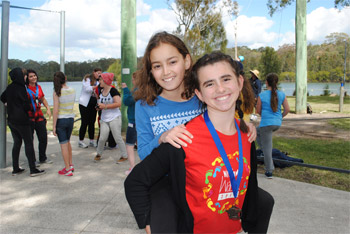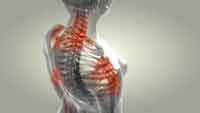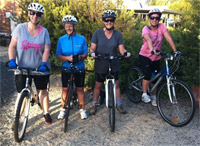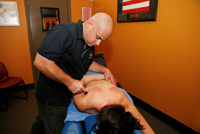Jannine Jackson Juvenile Arthritis Interview

Jannine Jackson Juvenile Arthritis Interview
Arthritis & Osteoporosis NSW has recently launched a concerted campaign to improve the levels of paediatric rheumatology throughout NSW in order to address this issue. With more than 6,000 children living with juvenile arthritis in NSW and thousands more yet to be diagnosed, the state health system is heading for a long-term crisis.
Currently, there are just 2 paediatric rheumatologists to care for more than 6,000 children struggling with juvenile arthritis. This has NSW falling well below international benchmarks, NSW Health standards and leaves NSW as the worst performing state in Australia.
The situation has reached a point where there is not enough paediatric rheumatologists in NSW to train new staff. Currently, any training has to be undertaken interstate or overseas.
Jannine Jackson, CEO of Arthritis & Osteoporosis NSW, is disturbed by the lack of resources afforded to paediatric rheumatology and has launched Arthritis & Osteoporosis NSW's new campaign to remedy this situation.
"The levels of paediatric rheumatology services in NSW are falling well below national and international benchmarks and that is leaving our children with a system that is ill-equipped and inadequate.
"Arthritis & Osteoporosis NSW is advocating for significant increases in resources for paediatric rheumatology to provide the care our children need. This is a massive problem, but we can't do it alone. We have mobilised our network of supporters across the state and we need your help!
"Investing now in new paediatric rheumatologists, physiotherapists, counsellors and other support services will not only make significant improvements in efficiency, it will prevent children with arthritis from becoming long-term users of the health system," said Jannine.
Arthritis & Osteoporosis NSW is advocating for a minimum of 4 full-time paediatric rheumatologists to provide care for the children of NSW and put kids with arthritis on the path to better health. To find out how you can be involved in demanding better for the children of NSW, contact Arthritis & Osteoporosis NSW on 1800 011 041 or visit www.arthritisnsw.org.au.
Interview with Jannine Jackson, CEO, Arthritis & Osteoporosis NSW
Question: What is Juvenile Arthritis?
Jannine Jackson: Juvenile idiopathic arthritis or JIA, or generally known as juvenile arthritis, refers to all types of arthritis that affect young people less than 16 years of age. JIA is the most common, as well as serious, persistent medical conditions of childhood. At least one child in every 1000 in Australia is diagnosed with JIA.
Question: How does this form of Arthritis differ?
Jannine Jackson: While some forms of JIA appear to be similar to some forms of adult arthritis, how it affects different parts of the body, and how it is treated can be quite different. There are five different forms of JIA;
2. Pauciarticular, Monoarthicular (one joint) and Oligoarthritis
3. Polyarticular JIA – both Rheumatoid Factor Negative and Positive (do not or do have Rheumatoid Factor antibodies)
4. Enthesitis related arthritis
5. Psoriatic Arthritis
A child's diagnosis will depend on which symptoms they experience as well the number of joints affected during the first 6 months of the disease. Each child's needs must be assessed on an individual basis.
Question: Why is this current campaign to raise awareness and funding for Juvenile Arthritis vital?
Jannine Jackson: In NSW there are just 2 full-time paediatric rheumatologists to care for more than 6,000 children with juvenile arthritis. This figure falls well below national and international standards. We are advocating for funding for a minimum of 6-8 paediatric rheumatologists in NSW to provide the arthritis care that children in NSW need.
Question: How do you hope to raise awareness for Juvenile Arthritis?
Jannine Jackson: We have recently launched our Juvenile Arthritis Campaign and have been busy mobilising our members and supporters to get involved and help us raise awareness of this issue. We have been utilising Facebook and Twitter, communicated directly to our members and encouraged people to write a letter to their local MP raising the lack of paediatric rheumatologists as an issue that needs to be addressed. If people would like to become a part of our Juvenile Arthritis Campaign they can - all the information is on our website about how people can get in contact with us and join us. The link for people to go is: http://arthritisnsw.org.au/support-us/our-juvenile-arthritis-campaign/
Question: What are the symptoms of Juvenile Arthritis?
Jannine Jackson: Each form of JIA have their own specific set of symptoms.
Ø Systemic Onset JIA
A high but fluctuating temperature
A salmon coloured rash all over the body
Swollen glands in the armpits, neck and groin
A lack of energy
At times it may cause inflammation of the liver and spleen
These early symptoms of JIA have also been called -Still's Disease', and can be confused with other childhood illnesses such as measles, and glandular fever.
Ø Pauciarticular, Monoarthicular (one joint) and Oligoarthritis
Four joints or less are affected.
It typically does not affect the same joints on each side of the body.
The child's general health is not usually affected.
There is a risk of developing uveitis (inflammation of the eye).
Ø Polyarticular – (Rheumatoid Factor (RF) Negative and RF Positive)
The onset of symptoms can be sudden.
Usually it affects many joints.
Usually it affects the same joints on each side of the body.
Children generally feel unwell, tired and listless.
Can cause anaemia (not enough red blood cells).
Looks very similar to adult rheumatoid arthritis (for +ve RF).
Ø Enthesitis related arthritis
Pain and inflammation occurs in the tendons and tissues around the joints rather than in the joints themselves. This is sometimes called enthesitis.
Most commonly, this form of JIA affects the spine, heel, hips, knees and ankles.
Children with this disease have an increased risk of developing uveitis.
Ø Psoriatic Arthritis
In addition to the joint pain, this form of JJIA also involves the skin.
This is usually seen as a scaly skin rash that can cover large areas of the body, called psoriasis.
The psoriasis may start at the same time as the joint pain, but not always.
Like other forms of JIA, there is a risk of developing uveitis.
Question: Can you talk us through how a child is diagnosed with Juvenile Arthritis?
Jannine Jackson: There is no single test to diagnose JIA. Instead, it involves a number of steps. These include:
Taking a detailed medical history of the child and their biologically related family members
Physical examinations
Laboratory tests
Other tests such as X-rays of the joints.
If JIA is suspected, children should be referred to a Rheumatologist who would confirm the diagnosis and then start treatment.
Question: What are the treatment options for children with Juvenile Arthritis?
Jannine Jackson: There are many different treatments available for JIA. Finding the right treatment for a child with JIA can involve a process of trial and error, and what might work for one child may not work for another. Treating JIA is a team effort, and the aim of any JIA treatment or management plan is to:
Reduce the symptoms (such as stiffness, pain and inflammation.
Enable the child to lead the most normal life as possible.
To slow or stop the progression of the illness.
Medicines play a major role in the management of JIA and these aim to:
Alter or slow the progression of the illness
Control inflammation
Relieve pain
Reduce fever
Reduce other symptoms of the disease
Assist with a child's -normal' growth and development
Question: What are your hopes for the Juvenile Arthritis campaign?
Jannine Jackson: Our hope is for a boost in the number of paediatric rheumatologists through an increase in funding. At the moment with just 2 full-time paediatric rheumatologists, there is only 12 minutes per year of care from funded specialist paediatric rheumatologists' in NSW public hospitals. With 6-8 paediatric rheumatologists in NSW, our state would be able to provide the care for children with arthritis, reduce waiting times and increase access so that care can be provided promptly and help treat and manage the condition.
Question: How can Australia support this campaign?
Jannine Jackson: There are a number of ways people across Australia can support our campaign. People can make a donation to our organisation on our website www.arthritisnsw.org.au or call 1800 011 041 (toll free) and support our efforts to raise awareness for juvenile arthritis. Other ways people can get involved include signing our petition for more paediatric rheumatologists (https://www.communityrun.org/petitions/we-need-more-paediatric-rheumatologists-in-nsw), sharing the petition on social media and for anyone from NSW, writing to their local MP to bring this issue to attention. If you want to get involved but are not sure where to start, please call us on 1800 011 041or visit www.arthritisnsw.org.au.
Interview by Brooke Hunter
Have You Seen This?
MORE










